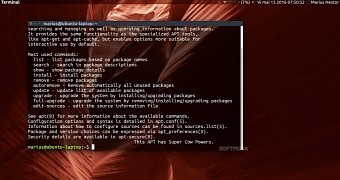On September 20, 2016, the APT development team, through Julian Andres Klode, announced the release of version 1.3 of the APT (Advanced Packaging Tool) command-line package manager.
APT 1.3 has been in the works since early May this year, and it received a total of twelve development releases that brought numerous improvements and new features to one of the oldest and most acclaimed package managers for Debian-based GNU/Linux distributions, such as Ubuntu and Linux Mint.
And the biggest ones worth mentioning here are support for multiple fingerprints in the Signed-By feature making package distribution more secure, along with Signed-By support in "Release" files in the form of HTTP Public Key Pinning (HPKP), as well as the ability to use the same redirection mirror for all index files.
Multiple improvements were added to the EDSP (External Dependency Solver Protocol) protocol specification, there's now proper formatting of multiline error messages, and warnings will be displayed if the apt-key command is run unconditionally in maintainerscript.
apt-ftparchive receives support for writing Signed-By fields
Other interesting changes added in APT 1.3 are the ability to use the EXPKEYSIG variable for gpgv (GNU Privacy Guard) instead of the KEYEXPIRED one, support for writing Signed-By fields to the apt-ftparchive command, and re-implementation of < multivalue >-{Add,Remove} support to the deb822 module.
Last but not least, when not all sources have failed, APT will automatically execute Post-Invoke-Success, a tag has been added to hash errors to indicate insufficiency, the Pkg.CandVersion() method was deprecated as it confused users, and IndexTargets received Identifier and Fallback-Of field implementations.
You can download the APT 1.3 sources right now via our website, but they should already be available for installation in the Debian Unstable channels, and will soon land in the main software repositories of other Debian-based operating systems, such as Ubuntu or Linux Mint.

 14 DAY TRIAL //
14 DAY TRIAL //